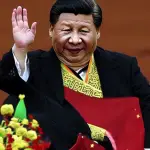In a world increasingly dominated by complex technology and bewildering scientific advancements, recent developments in quantum computing prompt a moment of reflection. On a seemingly ordinary Monday, a remarkable announcement emerged from Google’s Quantum AI team regarding their new quantum computer, Willow. This new technology has achieved what many could only once dream of—a processing power that allows it to solve problems in mere minutes that would take traditional supercomputers approximately 10 septillion years. This significant jump in computational ability raises profound questions about the implications of our journey into uncharted technological territory.
The announcement was not merely about numbers and computing power; it touched upon the very fabric of reality itself. The leader of Willow, Hartmut Neven, suggested that the rapid problem-solving capability could be linked to ideas in quantum physics, specifically the notion of parallel universes. This theory implies that every time a question is posed, all possibilities are simultaneously considered across different universes. Such theories might sound straight out of a science fiction novel, yet they reflect humanity’s enduring quest for understanding the universe’s mysteries. As the fabric of our reality gets unraveled through science, we must ponder whether technology is leading us toward enlightenment or chaos.
In stark contrast to these bewildering advancements, recent trends reveal something deeply human: a yearning for foundational truths. Bible sales in the United States have seen a remarkable surge of 22% this year, highlighting a revival in seeking spiritual wisdom amid the whirlwind of modernity. While book sales in general have continued to stagnate or decline, the rising demand for printed Bibles indicates that many individuals are turning to age-old principles and beliefs to anchor themselves in an era that feels increasingly unpredictable and disconcerting. This juxtaposition of technological progress and spiritual awakening invites contemplation about what people truly seek in their lives.
As quantum computing pushes boundaries and claims understanding of the universe, it also invites skepticism and inquiry. The complexities of such advancements spark debate among experts, revealing that even in realms where it appears we are making leaps of progress, uncertainty reigns. This uncertainty often leads society to question the validity of the knowledge produced. When faced with profound and often incomprehensible scientific breakthroughs, could it be that people’s instinctive response is to retreat to established truths found in faith and tradition? The increase in Bible sales suggests that for many, this foundational truth offers clarity and certainty that defies the chaos of scientific exploration.
A thoughtful examination of history reveals that as societies navigate periods of significant change or upheaval, they often witness a resurgence in interest in spirituality and moral philosophy. The juxtaposition of cutting-edge science heralding discoveries alongside the declination of traditional belief may seem contradictory, but it is not unfamiliar. Historical cycles show that humanity often oscillates between the realms of empirical knowledge and spiritual exploration. Was it not during times of great advancement and philosophical inquiry that figures like Copernicus and Galileo emerged, challenging established norms? Just as they sought answers to existence’s grand questions, modern individuals are looking for their answers in unprecedented change.
As the boundaries of understanding continue to expand in areas such as quantum computing, it challenges individuals to contemplate deeper existential inquiries. What do we truly understand about our universe? Who, if anyone, set the wheels of creation in motion? Amid the rapid changes, the human quest for meaning does not wither. Instead, it thrives, offering a reminder that no matter how advanced technology becomes, the foundational questions about existence and purpose remain. Ultimately, as society hurtles into a future shaped by quantum breakthroughs, the renewed interest in eternal truths may be the guiding light leading us through uncertainty, reminding us of the wisdom in our shared human experience.




